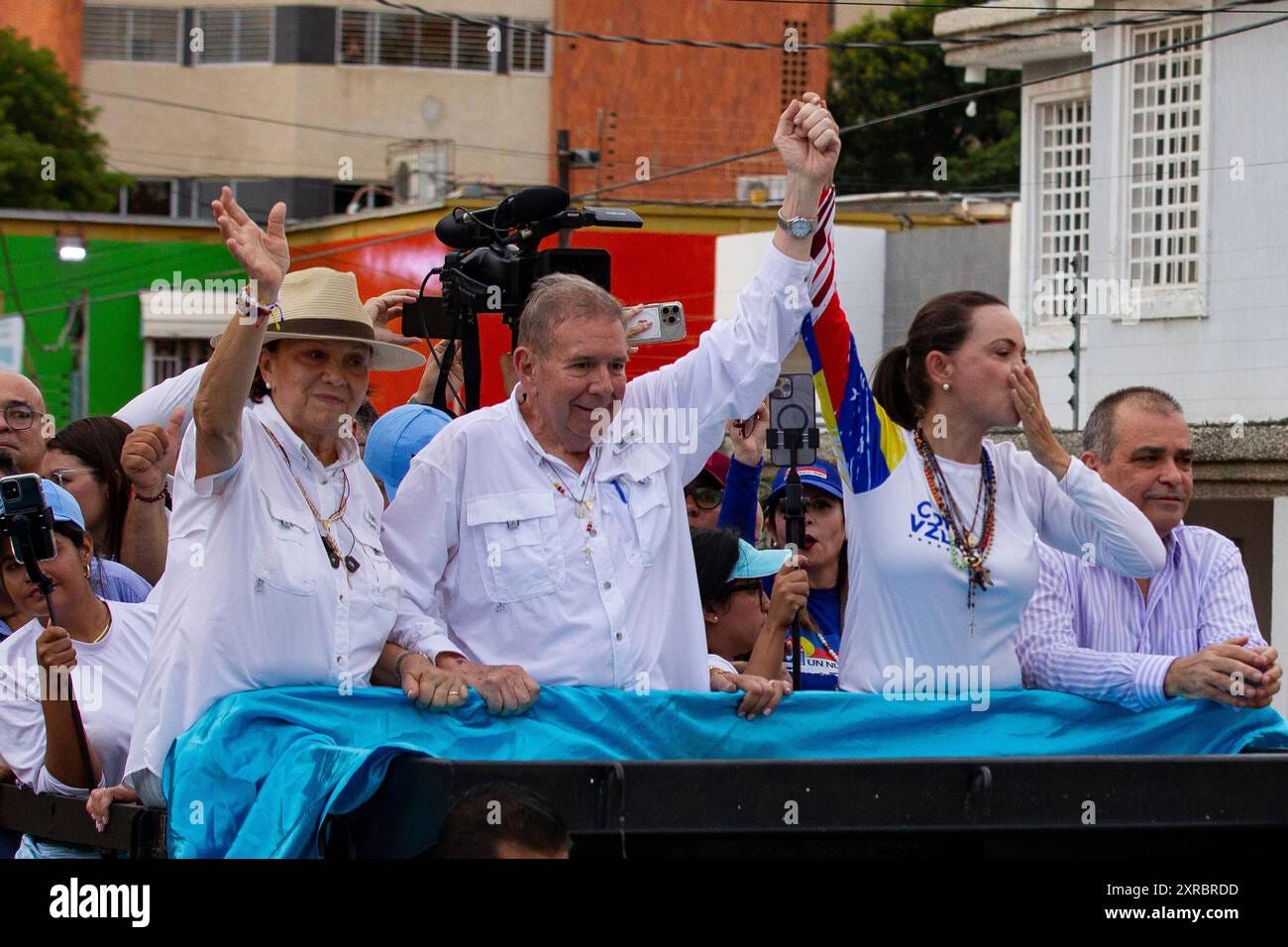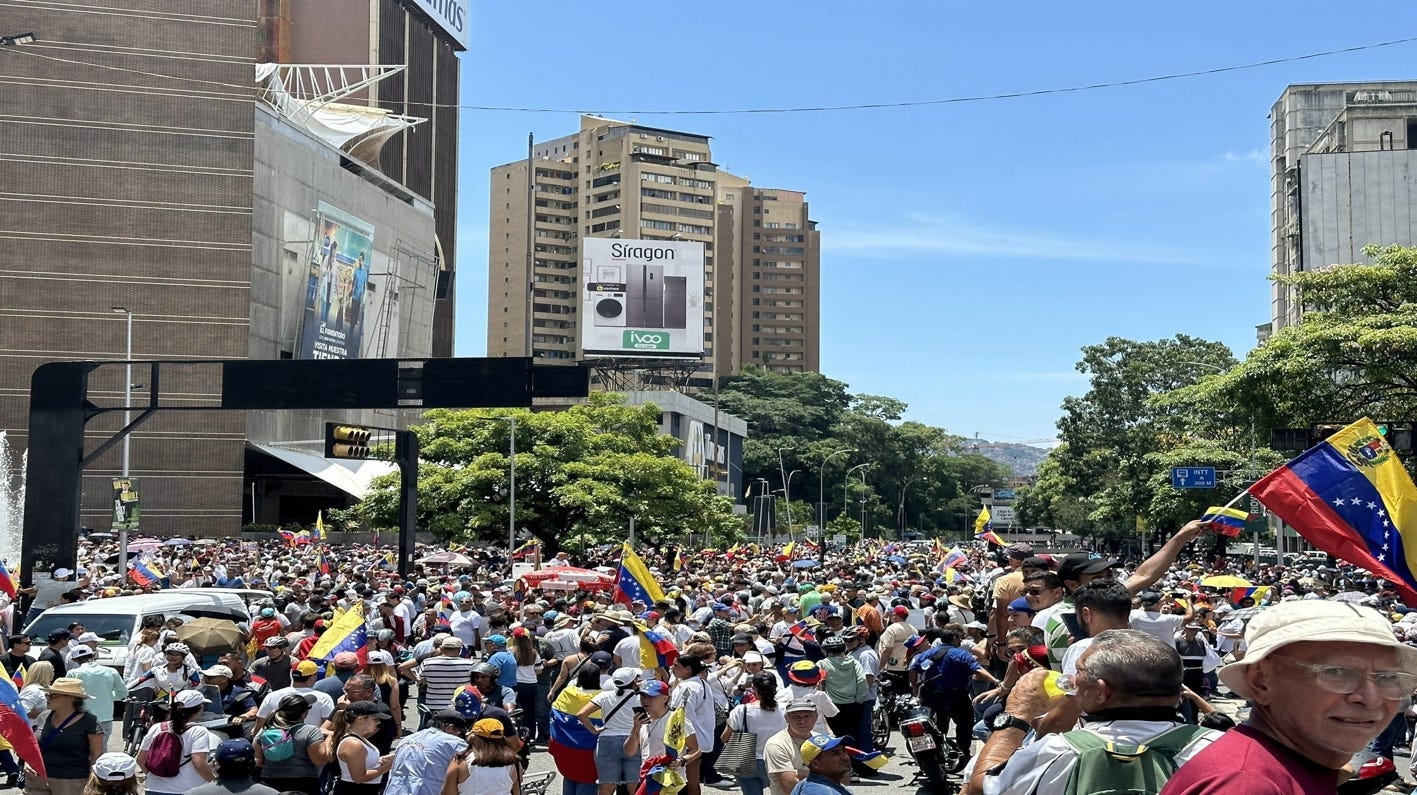They have bullets—but we have ballots
Thousands across the world rallied Saturday to support Edmundo González Urrutia and Venezuela's anti-Maduro movement
I’m skipping Cuban scoops this week to give the Venezuelan election crisis—so inextricably linked to Cuba—the attention it deserves. Many see it as the most important unfolding event in our hemisphere right now. I couldn’t agree more.
They have bullets, but we have ballots
I was talking with a Venezuelan friend this week about her father’s recent passing in Spain. “And what’s happening back home didn’t help him,” she said, referring to Maduro’s brutal crackdown on his opponents.
The conversation brought me back to my father’s final days last March. Major protests had just broken out again in Cuba, the largest since 11J. I whispered the news in his ear, and he smiled. One of the last times he gave me that gift.
In each of these moments, our fathers were revealing—again—the hidden “baggage” refugees and immigrants carry as they build new lives in safer countries. Two feet planted in their new world, marching forward, but a wary eye cast back home, hoping for peace and freedom, wondering, wondering, will I live to see that day?
Venezuelans are asking themselves that question right now. Many have one foot out the door right now. If Maduro leaves, they’ll stay. If Maduro stays, they’ll leave, following the almost eight million who’ve fled the country since 2014, to escape Chavismo’s brutality and failed policies.
My bet is that the massive and obvious election fraud by Maduro won’t matter in the end. He’ll stay put and we’ll see another huge wave of Venezuelans at the southern border and elsewhere, searching for refuge, freedom, stability. It hurts to admit it, especially after seeing courageous Venezuelans risking everything to have their voices heard.
There have been at least 2400 known detentions since the election and 24 deaths. The coercion of victims’ families to stay quiet means those numbers pale compared to the true counts. But with the regime’s total control of all institutions, especially the military, and the media, and the lack of a meaningful international effort to defend the opposition, the odds of Maduro leaving the house quietly are abysmal.
And, today, the Venezuelan supreme court (TSJ)—to no one’s surprise—declared Maduro the winner of the election. The court, controlled by Chavista judges, used data provided by the Maduro-friendly national electoral commission (CNE) to make its decision. The spokeswoman who announced the ruling, judge Caryslia Rodríguez, is a well-known Chavista loyalist. She didn’t identify the members of the evaluation team or describe the process it used, other than to describe the team as “experts” and the ruling as “unequivocable.”
I’d been monitoring headlines for Venezuela news and coming up dry—at least after the initial wave of articles that followed the 28 July election. The supreme court’s ruling has Venezuela back in the news today. But for how long? It’s no shock that Maduro timed the announcement on the day that the US would be focusing on Kamala Harris’s acceptance speech. The Cuban regime has developed this “look over there” tactic into an art form.
Meanwhile, Cuba’s state-controlled media has been awash with propaganda supporting Maduro. Cuba’s dependence on Venezuelan oil alone makes a vigorous pro-Maduro campaign a no-brainer. Add in Cuba’s strategic links to Venezuela’s military, its political and ideological investments in the country, and the shared alliance with Russia and company, and it’s easy to see why Maduro’s closest bodyguards are Cuban—although Russia’s Wagner Group is also part of the dictator’s Praetorian Guard.
The opposition coalition says it gathered, via their trained poll watchers and witnesses, 82% of the tally sheets after the polls closed. They’ve made the data available to reporters and election observers, as well as the general public at one point. The tallies show the opposition’s candidate, Edmundo González Urrutia, won 67% of the vote. Those results have now been backed by numerous governments, national and international groups, and a detailed analysis by the AP.

Last Saturday, opposition leaders called on supporters across the globe to take to the streets to support its well-documented win. Thousands responded, gathering in an estimated 350 cities around the globe— even in Caracas, despite the risk of persecution, beatings, and imprisonment by Maduro’s henchmen.
The Caracas footage showed almost no uniformed law enforcement in the crowds. But Venezuelans know that government-backed thugs and plainclothes agents, having been trained by Cuban military and secret police, were milling around them. They shouted their anti-Maduro slogans anyway.
Watching the clips of the demonstrations gave me piel de gallina (goosebumps) and made me think of my father again. I could almost see him among the older men in the crowds. Men and women, young people, elders, carried hand painted signs, waved flags, chanted libertad and other—often salty— slogans. Yoani Sánchez spotted a sign she liked so much she mentioned it in her podcast.“They have bullets, but we have ballots.”

I quoted that slogan to another friend just last night. We were having dinner (Gustazo, in Waltham, MA, has amazing Cuban fare) and the immigration crisis came up.
“But what can we do?” he asked the air above us after we’d ticked off one complexity after another—the moral dilemmas each migrant case raises, the brokenness of the system, the burden on migrant-heavy communities.
We can support Venezuela—I said.
Joseph Borrell, the EU’s high commissioner, is trying to do just that. In a recent statement he urged Maduro to respect the will of the voters, and “Venezuelan electoral authorities to publish and independently verify the electoral records.”
His statement quoted an interim report on the Venezuelan election by a UN panel of experts on presidential elections. The panel charged that “CNE [Venezuela’s national electoral commission] postponed and subsequently cancelled three key post-electoral audits,” adding that “CNE . . fell short of the basic transparency and integrity measures that are essential to holding credible elections.”
I admire the Venezuelan opposition’s leadership, its resolute yet peaceful message of resistance and insistence. But I admire average Venezuelan protestors more. The world knows the names of the opposition leaders hiding in the Argentinian embassy in Caracas. No one knows the name of the seventeen year old sitting in a crowded, filthy Caracas jail, in pain from the beating he took, worrying, because he knows it will be days and even weeks before his parents know where he is. Yet thousands continue to risk that and much worse to win back their freedom.
González Urrutia championed that valor when his supporters flooded plazas and streets across Venezuela last Saturday. “To all Venezuelans who’ve mobilized in each barrio, village, and town, raising your voices, here is my message and my words to sustain your spirits. Only united will we achieve respect for the will expressed by more than 7 million (Venezuelans).”
May that spirit thrive, and may old Venezuelans—and Cubans, Nicaraguans, and so many others—get to see the day they’ve dreamed of finally arrive.



